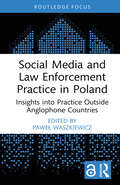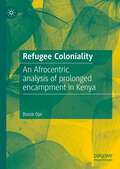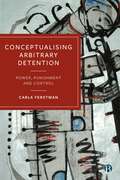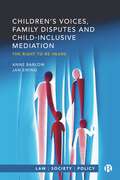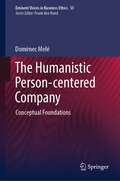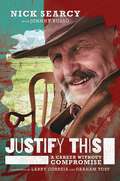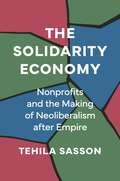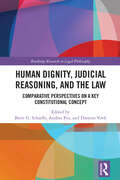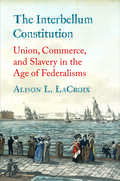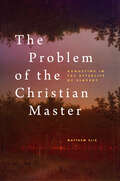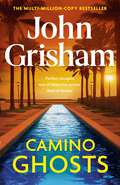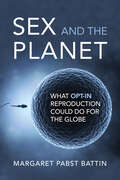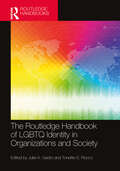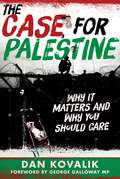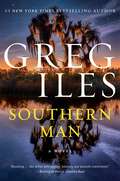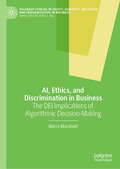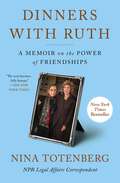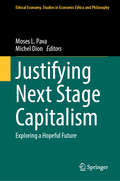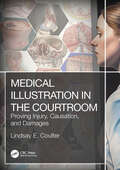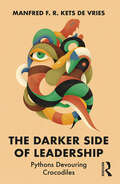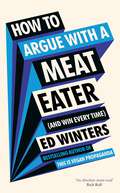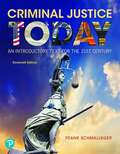- Table View
- List View
Social Media and Law Enforcement Practice in Poland: Insights into Practice Outside Anglophone Countries (Routledge Studies in Crime, Culture and Media)
by Paweł WaszkiewiczThis book explores the role of social media in the daily practice of Polish criminal justice and how social media is, in turn, reshaping this practice. Based on empirical research, it confronts common beliefs about how police officers, prosecutors, and judges use social media in their work. Readers will find answers to the following questions: Which social media platforms are popular among law enforcement officers in Poland? How do the police use social media to investigate and prosecute crimes? What are the strategies for using social media to communicate with the community? What strategies are most successful?The findings in this book challenge some popular beliefs and theories about social media in criminal justice. As the first book to explore the use of social media in criminal justice outside of English-speaking countries, this collection of academic research will be of interest to academics focusing on criminology, criminal justice, and policing and will be useful to police leaders and officers, police social media administrators, prosecutors, and judges, who may be inspired by the research to implement new successful and more effective practices.
Refugee Coloniality: An Afrocentric analysis of prolonged encampment in Kenya
by Bosco OpiThis book presents a decolonial and Afrocentric critique of prolonged encampment of refugees, centred on the case study of refugee camps in Kenya, introduced through the author’s decades-long experience of forced displacement. His positionality as a former refugee contributes to a wider discussion on representation, voice, and power within the refugee studies literature. Likewise, the revisiting of the refugee camp as site and tool of power from a colonial perspective, is an important and timely contribution to the literature. This book examines the camp as a colonial innovation and the enduring colonial logics of supposedly ‘humanitarian’ extended encampment. Drawing on the anti-colonial theorists such as Fanon, Mbembe, and Nyerere, etc, it argues for an Africa without borders or encampment. The study is interdisciplinary, encompassing forced migration/refugee studies, camp studies, decolonial studies, and African studies. More broadly, it seeks to contribute to the literature on the politics of asylum in Africa through a critical examination of the colonial origins and the practice of encampment in Kenya.
Conceptualising Arbitrary Detention: Power, Punishment and Control
by Carla FerstmanAvailable open access digitally under CC-BY-NC-ND licence This book examines what happens when states and other authorities use detention to abuse their power, deter dissent and maintain social hierarchies. Written by an author with decades of practical experience in the human rights field, the book examines a variety of scenarios where individuals are unlawfully detained in violation of their most basic rights to personal liberty and exposes the many fallacies associated with arbitrary detention. Proposing solutions for future policy to scrutinise processes, this is a call for greater respect for the rule of law and human rights.
Children’s Voices, Family Disputes and Child-Inclusive Mediation: The Right to Be Heard (Law, Society, Policy)
by Anne Barlow Jan EwingePDF and ePUB available open access under CC-BY-NC-ND licence. Recent legislative changes in England and Wales have eroded children’s ability to exercise their article 12 UNCRC rights to information, consultation and representation when parents separate. However, children’s voices may be heard through child-inclusive mediation (CIM). Considered from a children’s rights perspective, this book provides a critical socio-legal account of CIM practice. It draws on in-depth interviews with relationship professionals, mediators, parents and children, to consider the experiences, risks and benefits of CIM. It investigates obstacles to greater uptake of CIM and its role in improving children’s wellbeing and agency. Exploring the culture and practice changes necessary for a more routine application of CIM, the book demonstrates how reconceptualising CIM through a children’s rights framework could help to address barriers and improve outcomes for children.
The Humanistic Person-centered Company (Issues in Business Ethics #55)
by Domènec MeléHumanism in business is not only an alternative to economism but a way to human excellence. Humanism presented here revolves around the rich notion of “human person”, keystone of modern personalist philosophy and Catholic Social Teaching. From this perspective this book is offered to everyone, believer and nonbeliever alike. The person-centered humanism considers the human-wholeness, individual and relational, with subjectivity, self-determination, openness to transcendence, and with capacity not only to possess but also to give. It also highlights the uniqueness of each person, endowed with a high constitutive dignity and in continuous process of flourishing toward human plenitude. An attitude of respect and good will is due to non-personal beings, while persons deserve to be treated with justice and even with love of benevolence. The book is prepared in dialogue with mainstream of thought in business and business ethics and focused on exploring ways to improve some conventional views. It includes some proposals such as a person-based ethics, ethics understood as intrinsic to business activity, the consideration of the company as an organized community of persons, and the purpose of the company oriented toward the common good through a double mission, internal and external. It is also suggested substituting the notion of “stakeholder” for the richer one of “relationholder.”
Justify This: A Career Without Compromise
by Nick Searcy&“I&’ve played serial killers, rapists, racists, Klansmen, sexual harassers, thieves—I mean, let&’s face it. I&’ve played a LOT of Democrats.&” —Nick Searcy In Justify This, veteran character actor Nick Searcy takes you through his wide-ranging career, from both sides of the camera as an actor and director, to guest-hosting for Rush Limbaugh, managing a professional wrestler, co-starring in the hit show Justified—and somehow continuing to work in Hollywood even AFTER he went to Washington, DC, on January 6, 2021.Director of Gosnell: The Trial of America&’s Biggest Serial Killer and producer/star of the seminal documentary about January 6, Capitol Punishment, Nick&’s story of following his heart to become a professional actor and following his conscience and faith to stand up for what he believed—even though it might have cost him the career he built—will be an inspiration to you—and make you laugh along the way.Actor, director, producer, writer, wrestling manager, guest columnist, stand-up comic, filmmaker, and one of the meanest Twitter people ever, Nick Searcy is a unique voice of common sense in today&’s culture.
The Solidarity Economy: Nonprofits and the Making of Neoliberalism after Empire
by Tehila SassonThe untold story of the role of humanitarian NGOs in building the neoliberal order after empireAfter India gained independence in 1947, Britain reinvented its role in the global economy through nongovernmental aid organizations. Utilizing existing imperial networks and colonial bureaucracy, the nonprofit sector sought an ethical capitalism, one that would equalize relationships between British consumers and Third World producers as the age of empire was ending. The Solidarity Economy examines the role of nonstate actors in the major transformations of the world economy in the postwar era, showing how British NGOs charted a path to neoliberalism in their pursuit of ethical markets.Between the 1950s and 1990s, nonprofits sought to establish an alternative to Keynesianism through their welfare and development programs. Encouraging the fair trade of commodities and goods through microfinance, consumer boycotts, and corporate social responsibility, these programs emphasized decentralization, privatization, and entrepreneurship. Tehila Sasson tells the stories of the activists, economists, politicians, and businessmen who reimagined the marketplace as a workshop for global reform. She reveals how their ideas, though commonly associated with conservative neoliberal policies, were part of a nonprofit-driven endeavor by the liberal left to envision markets as autonomous and humanizing spaces, facilitating ethical relationships beyond the impersonal realm of the state.Drawing on dozens of newly available repositories from nongovernmental, international, national, and business archives, The Solidarity Economy reconstructs the political economy of these markets—from handicrafts and sugar to tea and coffee—shedding critical light on the postimperial origins of neoliberalism.
Camino Ghosts: The new thrilling novel from Sunday Times bestseller John Grisham
by John GrishamFollowing John Grisham's international bestsellers, Camino Island and Camino Winds, Camino Ghosts is the story of an island off the Florida coast with a haunted, violent history and an uncertain future.Dark Isle off the Florida coast is said to be cursed: drownings, disappearances and hauntings have been the fate of intruders. The people who lived there were once enslaved. Now abandoned, it is the target of greedy developers. Lovely Jackson is the last survivor and claims to be its legal owner. But there is not a shred of evidence to prove that is true. It's unlikely that the developers will be deterred by the claims of one old woman. They have millions; Lovely only has Steve Mahon, a pro bono environmental lawyer, and Mercer Mann, a floundering novelist, to fight in her corner. With the court case looming and the bulldozers waiting to roll in, Steve and Mercer are in a race against time to unearth the truth behind Lovely's story and save the legacy of the island.Praise for Camino Winds:'In American icon John Grisham's new novel, Camino Winds, an odd assortment of mystery and crime authors, some of them felons themselves, discover one of their colleagues has been murdered during the fury of a massive hurricane-the perfect crime scene' Delia Owens, author of Where the Crawdads Sing'The Camino Island series, featuring trouble-prone bookseller Bruce Cable, is a perfect escapist mix of detective action, insider riffs on the literary world - and even a little romance' Mail on Sunday'Camino Winds has all the usual Grisham hallmarks - a pacy plot and tension-filled scenes' Independent'Another compelling read from Grisham, and will satisfy old fans and please new readers alike' Press Association
Human Dignity, Judicial Reasoning, and the Law: Comparative Perspectives on a Key Constitutional Concept (Routledge Research in Legal Philosophy)
by Andrea Pin Brett G. Scharffs Dmytro VovkThis volume explores how national and international human rights courts interpret and apply human dignity. The book tracks the increasing deployment of the concept of human dignity within national and international courts in recent decades. It identifies how human-dignity-based arguments have expanded to cover larger sets of cases: from the right to life or to integrity or anti-discrimination, the concept has surfaced in disputes about political and social rights and rule of law requirements, such as equality or legal certainty. The core message of the book is that judges understand, interpret, and apply human dignity differently. An inflation in the judicial recourse to human dignity can saturate the legal environment, depriving the concepts as well as human-rights-based narratives of salience, and threaten the predictability of court decisions. The book will appeal to philosophers of law, constitutional theorists and lawyers, legal comparativists, and internal law specialists. Whilst being dedicated specifically to human dignity jurisprudence, the book touches on many aspects of judiciary and as such will also be of interest to researchers studying legal reasoning, interpretation and application of the law and courts, as well as social philosophers, political scientists, and sociologists of law, politics, and religion.
The Interbellum Constitution: Union, Commerce, and Slavery in the Age of Federalisms (Yale Law Library Series in Legal History and Reference)
by Alison L. LaCroixA synthesis of legal, political, and social history to show how the post-founding generations were forced to rethink and substantially revise the U.S. constitutional vision Between 1815 and 1861, American constitutional law and politics underwent a profound transformation. These decades of the Interbellum Constitution were a foundational period of both constitutional crisis and creativity. The Interbellum Constitution was a set of widely shared legal and political principles, combined with a thoroughgoing commitment to investing those principles with meaning through debate. Each of these shared principles—commerce, concurrent power, and jurisdictional multiplicity—concerned what we now call &“federalism,&” meaning that they pertain to the relationships among multiple levels of government with varying degrees of autonomy. Alison L. LaCroix argues, however, that there existed many more federalisms in the early nineteenth century than today&’s constitutional debates admit. As LaCroix shows, this was a period of intense rethinking of the very basis of the U.S. national model—a problem debated everywhere, from newspapers and statehouses to local pubs and pulpits, ultimately leading both to civil war and to a new, more unified constitutional vision. This book is the first that synthesizes the legal, political, and social history of the early nineteenth century to show how deeply these constitutional questions dominated the discourse of the time.
The Problem of the Christian Master: Augustine in the Afterlife of Slavery
by Matthew EliaA bold rereading of Augustinian thought for a world still haunted by slavery Over the last two decades, scholars have made a striking return to the resources of the Augustinian tradition to theorize citizenship, virtue, and the place of religion in public life. However, these scholars have not sufficiently attended to Augustine&’s embrace of the position of the Christian slaveholder. To confront a racialized world, the modern Augustinian tradition of political thought must reckon with its own entanglements with the afterlife of the white Christian master. Drawing Augustine&’s politics and the resources of modern Black thought into extended dialogue, Matthew Elia develops a critical analysis of the enduring problem of the Christian master, even as he presses toward an alternative interpretation of key concepts of ethical life—agency, virtue, temporality—against and beyond the framework of mastery. Amid democratic crises and racial injustice on multiple fronts, the book breathes fresh life into conversations on religion and the public square by showing how ancient and contemporary sources at once clash and converge in surprising ways. It imaginatively carves a path forward for the enduring humanities inquiry into the nature of our common life and the perennial problem of social and political domination.
Camino Ghosts: The new thrilling novel from Sunday Times bestseller John Grisham
by John GrishamFollowing John Grisham's international bestsellers, Camino Island and Camino Winds, Camino Ghosts is the story of an island off the Florida coast with a haunted, violent history and an uncertain future.Dark Isle off the Florida coast is said to be cursed: drownings, disappearances and hauntings have been the fate of intruders. The people who lived there were once enslaved. Now abandoned, it is the target of greedy developers. Lovely Jackson is the last survivor and claims to be its legal owner. But there is not a shred of evidence to prove that is true. It's unlikely that the developers will be deterred by the claims of one old woman. They have millions; Lovely only has Steve Mahon, a pro bono environmental lawyer, and Mercer Mann, a floundering novelist, to fight in her corner. With the court case looming and the bulldozers waiting to roll in, Steve and Mercer are in a race against time to unearth the truth behind Lovely's story and save the legacy of the island.Praise for Camino Winds:'In American icon John Grisham's new novel, Camino Winds, an odd assortment of mystery and crime authors, some of them felons themselves, discover one of their colleagues has been murdered during the fury of a massive hurricane-the perfect crime scene' Delia Owens, author of Where the Crawdads Sing'The Camino Island series, featuring trouble-prone bookseller Bruce Cable, is a perfect escapist mix of detective action, insider riffs on the literary world - and even a little romance' Mail on Sunday'Camino Winds has all the usual Grisham hallmarks - a pacy plot and tension-filled scenes' Independent'Another compelling read from Grisham, and will satisfy old fans and please new readers alike' Press Association
Kanzleimanagement in der Praxis: Führung und Management für Kanzleien und Wirtschaftsprüfer
by Claudia SchieblonVon Praktikern für Praktiker: Dieses Buch gibt einen Überblick über die aktuell wichtigen Themen des Kanzleimanagements. Die Autoren sind erfahrene Managing Partner, COOs und Leiter der Business Service-Einheiten von national wie international agierenden Wirtschaftskanzleien. Das Buch richtet sich an Anwälte, Wirtschaftsprüfer und Steuerberater aus kleinen wie großen Kanzleien sowie an Fachleute aus dem Kanzleimanagement und solche, die es werden wollen. Es soll ihnen eine Hilfestellung bei den besonderen Fragestellungen von Kanzleien bieten.Für die 5. Auflage wurde das Buch vollständig überarbeitet und um zahlreiche Themen ergänzt.
Die Auswirkungen der hohen Inflationsraten auf die Unternehmensbewertungen (essentials)
by Stefan Georg Tatjana Derr Chris HeilerDas essential untersucht den Einfluss hoher Inflationsraten auf die Unternehmensbewertung mittels Discounted-Cashflow-Methoden. Dabei analysiert es umfassend die Auswirkungen auf Einnahmen und Gesamtwert, hebt konkret betroffene DCF-Parameter hervor und validiert theoretische Prognosen anhand einer DAX-40-Unternehmensanalyse.
Sex and the Planet: What Opt-In Reproduction Could Do for the Globe (Basic Bioethics)
by Margaret Pabst BattinWhat if human reproduction was always elective? A prominent bioethicist speculates about the possibilities—and the likely consequences.What would the world be like if all pregnancy was intended, not unintended as it is nearly half the time now? Considerably better, Margaret Pabst Battin suggests in Sex and the Planet, a provocative thought experiment with far-reaching real-world implications. Many of the world&’s most vexing and seemingly intractable issues begin with sex—when sperm meets egg, as Battin puts it—abortion, adolescent pregnancy, high-risk pregnancy, sexual violence, population growth and decline. Rethinking reproductive rights and exposing our many mistaken assumptions about sex, Sex and the Planet offers an optimistic picture of how we might solve these problems—by drastically curtailing unintended pregnancies using currently available methods.How we see this picture—as recommendation, prediction, utopian fantasy, totalitarian plot, hypothetical conjecture, or realistic solution—depends to a great degree on which of thirteen problematic assumptions we maintain, assumptions Battin works to identify and challenge. Taking on sensitive topics like abortion and rape and religious issues around contraception, she shows how a fully informed, nonideological approach could defuse much of the friction such issues tend to generate. Also, in her attention to male contraception and the asymmetry of female and male reproductive control, she pulls in the 50 percent of the human race—those with Y chromosomes—largely left out of discussions of reproductive health. Sex and the Planet, finally, takes a global view, inviting us to consider a possible—even plausible—reproductive future.
The Routledge Handbook of LGBTQ Identity in Organizations and Society (Routledge International Handbooks)
by Tonette S. Rocco Julie A. GedroSexuality, gender, gender identity, and gender expression are fluid constructs, and the ways in which identity development intersects with organizations and exists in society are complex. The book is comprised of a range of multi-disciplinary and globally inspired perspectives representing leading-edge scholarship by authors from over a dozen countries on a range of issues and contexts regarding LGBTQ identity and experience. It is intended for a wide readership: those who are in LGBTQ-related academic fields; those who want to broaden their coursework by offering supplemental readings that center the perspectives of LGBTQ identities; and those who want to acquire knowledge and education on the subject of LGBTQ identity. There are 36 chapters written by scholars in fields such as social work, law, queer studies, business, human resource management and development, entrepreneurship, criminal justice, economics, marketing, religion, architecture, sport, theater, psychology, human ecology, and adult education. The chapters can be read in sequence, and the book can also be used as a reference work for which educators, practitioners, and non-academics can identify and select particular chapters that inform areas of inquiry.
The Case for Palestine: Why It Matters and Why You Should Care
by Dan KovalikIn 1948, the State of Israel was founded. While the philosophy of Zionism that advocated for a Jewish homeland in what was then known as Palestine dates back to 1897, the creation of Israel in 1948 was justified by the terrible crime of the Holocaust committed by Nazi Germany during WWII. Many defenders of Israel would like us to believe that the creation of Israel was a peaceful process on a barely populated land, however, this is far from true. Rather, the creation of Israel was accompanied by what is known by the Palestinians as the Nakba(catastrophe)—an operation in which 700,000 Palestinians were violently expelled from their land and their homes. Since that time, Israel has continued to usurp more and more land from the Palestinians who they falsely portray as a people without a history and without a culture. Israel has been particularly cruel to the people of Gaza—70 percent of whom are refugees from the 1948 Nakba. Gaza has been converted by Israel into what some call a giant open-air prison surrounded by barbed wire. It is in this context that we are currently witnessing the tragic violence between Israel and the people of Gaza—violence on a scale not seen in this land since the Nakba of 1948. Indeed, many Palestinians are calling this a second Nakba, with around 1.5 million Palestinians already displaced and thousands killed. All of this is being accomplished by Israel with critical military and diplomatic support from the United States. This second Nakba is also being facilitated by the mainstream press that both downplays and justifies what many believe to be genocidal violence against the Palestinian people. The Case for Palestine is written as a counternarrative, with the hope that, if the truth is told, this violence and displacement can be stopped before it is too late; before Gaza is no more.
Southern Man: A Novel (Penn Cage #7)
by Greg Iles“Greg Iles is one of America’s great storytellers." –Stephen King, #1 New York Times bestselling author"A first-rate political thriller."–John Grisham, #1 New York Times bestselling authorThe hugely anticipated new Penn Cage novel from the #1 New York Times bestselling author of the Natchez Burning trilogy and Cemetery Road, about a man—and a town—rocked by anarchy and tragedy, but unbowed in the fight to save those they loveFifteen years after the events of the Natchez Burning trilogy, Penn Cage is alone. Nearly all his loved ones are dead, his old allies gone, and he carries a mortal secret that separates him from the world. But Penn’s exile comes to an end when a brawl at a Mississippi rap festival triggers a bloody mass shooting—one that nearly takes the life of his daughter Annie.As the stunned cities of Natchez and Bienville reel, antebellum plantation homes continue to burn and the deadly attacks are claimed by a Black radical group as historic acts of justice. Panic sweeps through the tourist communities, driving them inexorably toward a race war.But what might have been only a regional sideshow of the 2024 Presidential election explodes into national prominence, thanks to the stunning ascent of Robert E. Lee White, a Southern war hero who seizes the public imagination as a third-party candidate. Dubbed “the Tik-Tok Man,” and funded by an eccentric Mississippi billionaire, Bobby White rides the glory of his Special Forces record to an unprecedented run at the White House—one unseen since the campaign of H. Ross Perot.To triumph over the national party machines, Bobby evolves a plan of unimaginable daring. One fateful autumn weekend, with White set to declare his candidacy in all fifty states, the forces polarizing America line up against one another: Black vs. white, states vs. the federal government, democracy vs. Fascism. Teaming with his fearless daughter (now a civil rights lawyer) and a former Black Panther who spent most of his life in Parchman Prison, Penn tears into Bobby White’s pursuit of the Presidency and ultimately risks a second Civil War to try to expose its motivation to the world, before the America of our Constitution slides into the abyss.In Southern Man, Greg Iles returns to the riveting style and historic depth that made the Natchez Burning trilogy a searing masterpiece and hurls the narrative fifteen years forward into our current moment—where America itself teeters on the brink of anarchy.
AI, Ethics, and Discrimination in Business: The DEI Implications of Algorithmic Decision-Making (Palgrave Studies in Equity, Diversity, Inclusion, and Indigenization in Business)
by Marco MarabelliThis book takes a historical approach to explore data, algorithms, their use in practice through applications of AI in various settings, and all of the surrounding ethical and DEI implications. Summarizing our current knowledge and highlighting gaps, it offers original examples from empirical research in various settings, such as healthcare, social media, and the GIG economy.The author investigates how systems relying on a binary structure (machines) work in systems that are instead analogic (societies). Further, he examines how underrepresented populations, who have been historically penalized by technologies, can play an active role in the design of automated systems, with a specific focus on the US legal and social system.One issue is that main tasks of machines concern classification, which, while efficient for speeding up decision-making processes, are inherently biased. Ultimately, this work advocates for ethical design and responsible implementation and deployment of technology in organizations and society through through government-sponsored social justice, in contrast with free market policies.This interdisciplinary text contributes to the timely and relevant debate on algorithmic fairness, biases, and potential discriminations. It will appeal to researchers in business ethics and information systems while building on theories from anthropology, psychology, sociology, management, marketing, and economics.
Dinners with Ruth: A Memoir on the Power of Friendships
by Nina TotenbergCelebrated NPR correspondent Nina Totenberg delivers an extraordinary memoir of her personal successes, struggles, and life-affirming relationships, including her beautiful friendship of nearly fifty years with Supreme Court Justice Ruth Bader Ginsburg.Four years before Nina Totenberg was hired at NPR, where she cemented her legacy as a prizewinning reporter, and nearly twenty-two years before Ruth Bader Ginsburg was appointed to the Supreme Court, Nina called Ruth. A reporter for The National Observer, Nina was curious about Ruth&’s legal brief, asking the Supreme Court to do something revolutionary: declare a law that discriminated &“on the basis of sex&” to be unconstitutional. In a time when women were fired for becoming pregnant, often could not apply for credit cards, or get a mortgage in their own names, Ruth patiently explained her argument. That call launched a remarkable, nearly fifty-year friendship. Dinners with Ruth is an extraordinary account of two women who paved the way for future generations by tearing down professional and legal barriers. It is also an intimate memoir of the power of friendships as women began to pry open career doors and transform the workplace. At the story&’s heart is one, special relationship: Ruth and Nina saw each other not only through personal joys, but also illness, loss, and widowhood. During the devastating illness and eventual death of Nina&’s first husband, Ruth drew her out of grief; twelve years later, Nina would reciprocate when Ruth&’s beloved husband died. They shared not only a love of opera, but also of shopping, as they instinctively understood that clothes were armor for women who wanted to be taken seriously in a workplace dominated by men. During Ruth&’s last year, they shared so many small dinners that Saturdays were &“reserved for Ruth&” in Nina&’s house. Dinners with Ruth also weaves together compelling, personal portraits of other fascinating women and men from Nina&’s life, including her cherished NPR colleagues Cokie Roberts and Linda Wertheimer; her beloved husbands; her friendships with multiple Supreme Court Justices, including Lewis Powell, William Brennan, and Antonin Scalia, and Nina&’s own family—her father, the legendary violinist Roman Totenberg, and her &“best friends,&” her sisters. Inspiring and revelatory, Dinners with Ruth is a moving story of the joy and true meaning of friendship.
Justifying Next Stage Capitalism: Exploring a Hopeful Future (Ethical Economy #68)
by Michel Dion Moses L. PavaThis book explores emerging justifications of capitalism based on the views of academics from around the world in business. The traditional justification for capitalism has been that it is the one system that produces the most wealth with the least cost for the most people. While this justification no longer has the taken-for-granted status it once enjoyed, it remains the dominant and mainstream argument in favor of capitalism, especially in the United States. Despite capitalism’s production of human wealth, it is implicated by trends such as income and wealth inequalities, climate change caused by the burning of fossil fuels and racism, sexism and other forms of discrimination. This volume asserts that in this age of complexity, inequality, and ecological instability, capitalism’s future depends on our ability to broaden the justifications for it to include a much more elaborate list of values beyond wealth and efficiency. It does so without claiming tologically or empirically prove that capitalism is the best of all possible economic systems, but rather to explore a new and hopeful future for the system; Next stage capitalism. Written by an international group of scholars from various disciplines, this book is of great interest to those who work in philosophy, sociology, political science, history and theology and religious studies.
Medical Illustration in the Courtroom: Proving Injury, Causation, and Damages
by Lindsay E. CoulterMedical Illustration in the Courtroom: Proving Injury, Causation, and Damages educates the reader on how to communicate science visually—in personal injury, medical malpractice, criminal, and forensic cases—by creating art that utilizes medical records, radiographs, and computer software. Medical illustration bridges the gap between complex technical, medical, and scientific concepts to clearly illustrate, and explain visually, a medical condition, negligence, or the causation of an injury or death to the lay person. Medical artists are frequently challenged with illustrating injuries and medical conditions that can’t be seen by the naked eye. And while using medical photography and imaging for illustrative purposes can be helpful, to an untrained eye it can often be unclear or confusing. This is where the medical illustrator enters the equation. There are often patients who have recovered from an injury or infection that appear in good health. However, should an unforeseen injury or fatality happen, medical illustrators can reveal to people what’s actually going on inside the person, an invaluable asset to attorneys in the courtroom—especially for personal injury and medical malpractice cases. While many attorneys utilize medical artists, nonvisual people don’t always recognize the value of demonstrative aids until they see them first-hand.When attorneys and their clients enlist the aid of medical artists, it quickly becomes apparent that properly conceived and executed artwork is invaluable to illustrating the facts—and medical impacts—of any number of scenarios: homicides by shooting, stabbings, vehicular accidents, in addition to medical malpractice and personal injuries resulting from surgery or possible negligence.Presenting a myriad of services and computer technologies that can be utilized, Medical Illustration in the Courtroom provides demonstrative aids used in cases to illustrate personal injury and medical malpractice, employing "tricks of the trade" to create an accurate effective image. Such images are educational to attorneys, insurance adjusters, judges, and juries to help create a visual storyline, the goal being to help combine art and science to provide a clear illustration of events to help in adjudicate legal and forensic cases.
The Darker Side of Leadership: Pythons Devouring Crocodiles
by Manfred F. Kets de VriesManfred Kets de Vries is one of the most authoritative voices on organizational dynamics, leadership, executive coaching, and psychotherapy today. In all his roles, he has noticed that questions are now, increasingly, coming back to one thing – the wider state of the world. Using an engaging and highly readable style throughout the book, Manfred helps us to make sense of the confusing and, some might say, psychotic times in which we now live.Revealing the darker side of leadership, Manfred explores the tendency for people to adopt ‘sheeple’ or herd-like behavior, the populist threat that we are facing, the dangers that come with feelings of perceived injustice, the rise of dictatorships, and the impact of Leviathan (neo-authoritarian) leadership behavior. Guided by theoretical concepts, the book provides readers with a better understanding of the underlying forces that drive these phenomena to the surface. What are the psychological dynamics at play? Why do groups of people behave in this manner? Beyond merely diagnosing what’s happening, Manfred introduces various coping strategies to counteract the emergence of these regressive forces.The book offers a unique and original approach to answering the micro- and macro-psychological questions of how to mitigate against populism and autocratic leadership, and will be of interest to the general reader as well as the key audiences of organizational leaders, psychoanalysts, coaches, psychotherapists, sociologists and social psychologists.
How to Argue With a Meat Eater (And Win Every Time)
by Ed WintersAn empowering and deeply informative book – MobyChallenge their beliefs; change the worldIf you are a vegan, you’ll know all too well how provocative it can be – you never know when you’ll be challenged or how. But being able to face down and rebut arguments against veganism is hugely important. Not just because many of the arguments lack substance, but because every interaction provides a pivotal moment to create change.How to Argue With a Meat Eater will teach you to not only become a skilled debater, sharing the secrets of renowned vegan educator Ed Winters, but it will arm you with powerful facts and insights that will give pause to even the most devout meat eater.Providing you with the knowledge to become a better conversationalist and critical thinker, and the motivation to create a more ethical, kind and sustainable world, let this book be your guide and inspiration to know that, no matter what the argument, you can win every time.
Criminal Justice Today: An Introductory Text For The 21st Century [high School Edition]
by Frank SchmallegerCriminal Justice Today introduces criminal justice through the lens of freedom and security. Focusing on the crime picture in the US, the authors present comprehensive coverage of the three traditional elements of the criminal justice system: police, courts and corrections. Built around the theme of tension between individual rights and public order, the text challenges you to evaluate the strengths and weaknesses of the American justice system. The 16th Edition has been updated to reflect current issues. An expanded selection of Freedom or Safety boxes poses critical-thinking questions assessing whether and how the criminal justice system balances individual rights and public safety.
